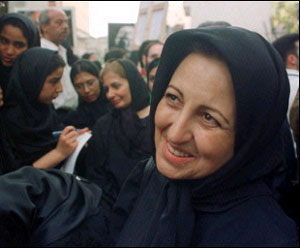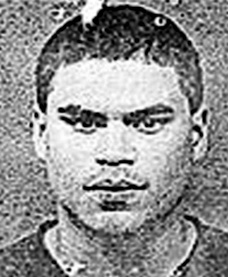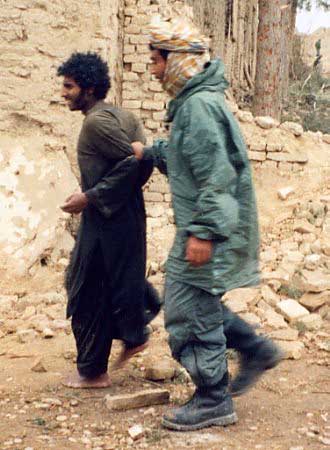Sistani, the UIA and the Elections
Anthony Shadid on Sunday in WaPo captured the edgy reality of life on the ground in Iraq in the build-up to the elections, and the anxieties of the Sunni Arabs before the advance of the Shiite political tsunami.
The death toll in Sunday's guerrilla attacks rose to 44, with about 100 wounded. One attack late in the day in Mosul wounded 7 US troops. It is unclear whether the NYT estimate includes the 10-15 British soldiers lost in an air crash.
The Iraqi election commission backed off its initial estimate of 72% turnout rather quickly. It then suggested that 8 million voted, or 60%. I don't think they really know, and would be careful of using these figures until they can be confirmed as the vote is counted. I saw them on Arab satellite tv estimating the turnout in Irbil in the Kurdish north at 60 percent. The turnout in Irbil should have been very high, since it is Kurdish and security is good. If that figure is true and holds, it would be an argument against the overall voting rate being 60 percent.
Muhammad Bazzi at Newsday discusses Grand Ayatollah Ali Sistani's role in the recent elections and his likely role in crafting the new constitution. He writes:
' Al-Sistani is especially keen to have a role in shaping the new constitution, which is supposed to be drafted by mid-August and put to a national referendum by Oct. 15. He is concerned about two issues: the role of Islam in Iraqi society and the extent of the political autonomy that would be granted to Kurds in northern Iraq. The ayatollah wants Islam to be declared the country's official faith and Islamic law to infuse civil laws. He is also resistant to giving Kurds a veto power over the constitution, as they currently have under an administrative law put in place by the U.S. occupation. Part of the reason for al-Sistani's backing of the unified Shia slate is to assure him a key role in drafting the constitution. But that is likely to rekindle the debate over the role of clergy in politics. "Al-Sistani wants to have a strong hand in drafting the constitution," Shammari said. "This will renew questions about what role he wants to play in politics." '
Sistani congratulated the Iraqi people on coming out to vote on Sunday. He expressed regret that his Iranian nationality made it impossible for him to vote. (Prominent Shiite Iranians declined to take Iraqi citizenship during the past century because being a foreign national often gave them immunity from harsh treatment by the Iraqi state.)
Three views of the voting in the Shiite shrine city of Najaf, Sistani's adopted city:
Sistani's adopted city, Najaf, witnessed a high turnout of voters, who cast their ballots (from all accounts) heavily in favor of the United Iraqi Alliance, the list cobbled together under Sistani's auspices.
Dan Murphy of CSM reports on the mood in Najaf in more detail.
Rory Carroll of the Guardian reports from Najaf that rubble is everywhere and some think Allawi will survive as Prime Minister. He quotes a Western diplomat: ' "Sistani has played it brilliantly . . . By reining in his radicals and going for elections, power is falling into the Shia lap." '
William Walls of the FT reports on the festive and defiant atmosphere of the far-south city of Basra (pop. 1.3 million). He expects the United Iraqi Alliance to do very well there, also.
Ashraf Khalil at the LA Times covers the questions that have been raised about the durability of the Shiite coalition, the United Iraqi Alliance, that Sistani has blessed. It is true that it is a hodgepodge of parties, but it seems to me that there is a good chance it will stay together on the whole. Khalil writes (and at the end quotes me):
' Disunity among the Shiite partners, "is one of the threats facing the list," said Ibrahim Bahr Uloum, a former minister of oil and Alliance candidate whose Iraq of the Future ticket is competing with the Supreme Council and Dawa in the Najaf provincial elections.
"Locally, there is some room for competition," he said, "but at the same time on a national level we have to cooperate."
Uloum predicted that "mutual respect" for the Shiite religious elite of whom Sistani is the most prominent member would help keep the factions in line.
Juan Cole, a University of Michigan history professor and expert on Shiite politics, predicted that enlightened self-interest would serve as "a powerful incentive for [the alliance's] various members to dampen down resentments and rivalries and cooperate."
"Controlling the Iraqi parliament is worth $17 billion a year in patronage," he said. "Pulling out of the ruling coalition and depriving yourself of any part of that would be a strange thing to do. Some immature groups might do it out of anger and annoyance, but they'd be very sorry." '
Sunni Arab turnout in the elections was light. The Sunnis in Samarra, a city of 200,000, only cast 1400 ballots. Ash-Sharq al-Awsat also reported that Tikrit's polling stations were deserted.
In eastern Mosul, where Turkmen and Kurds predominate, there was some turnout, but in the Sunni Arab western part of the city, firefights raged. The Arabs of Kirkuk appear largely to have boycotted the vote, whereas the Kurds came out enthusiastically (-al-Zaman).
Evan Osnos of the Chicago Tribune writes,
' In the Sunni-dominated cities of Latifiyah and Mahmoudiyah south of Baghdad, streets were largely free of violence, but voters said they were fearful of retaliation for voting. Polling centers were largely empty all day in many cities of the Sunni Triangle north and west of the capital, particularly Fallujah, Ramadi and Beiji, The Associated Press reported. In Baghdad's mainly Sunni Arab area of Adhamiyah, the neighborhood's four polling centers did not open, residents said. '
Dexter Filkins of the NYT wrote, ' In the town of Baji in northern Iraq, election officials did not show up. In Ramadi, where Iraqi officials set up a pair of polling places just outside the city, a total of just 300 ballots were cast, many of them by police officers and soldiers. '
The idea, mentioned by Condoleeza Rice on Sunday, that any significant number of Fallujans voted, is absurd and insulting. Most of the 250,000 Fallujans are still in exile, and the city is still occasionally the scene of fighting. There are reports of some voting in refugee camps outside the city. It is almost certainly motivated by a desire to have a legitimate, elected government that could effectively demand a US withdrawal.
Although some observers seem to be optimistic about the Sunni Arab vote, from what I could find out Sunday night, the signs were not actually good.
As for the neighbors, this Turkish author clearly fears both the religiosity of the Shiite party and the possible subnationalism of the Kurds.
In contrast, Iran clearly expects to benefit from the likely Shiite victory in the elections.
For "cont'd" postings, click here.
|
|
 |  |  |
|---|
| Email to a Friend: | |
|---|









 |
|
 Facebook
Facebook




